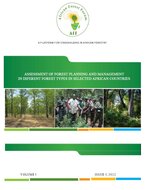This study is part of a project on “Strengthening management and use of forest ecosystems for sustainable development in Africa”, which is funded by the Swedish International Development Cooperation Agency (Sida) and implemented by the African Forest Forum (AFF). The overall goal of the project is “to generate and share knowledge and information through partnerships in ways that provide inputs into policy and decision-making options and capacity building, for improved forest management that better addresses poverty eradication and environmental protection in Africa”. One of the key project objectives is to identify and promote opportunities for protecting and sustainably managing the forest resource base of the continent as well as the supply of its ecosystem’ goods and services. The consultancy assignment of which this report is part of is titled: “Assessment of forest planning and management in different forest types in selected African countries”. The purpose of the study is to evaluate ways for improving forest planning and forest management in selected countries in Anglophone and Lusophone Africa with the aim to enhance the supply of forest ecosystem goods and services. This particular report covers only some select countries from Anglophone and Lusophone Africa.
The specific objectives of the study are: On forest planning: a) Evaluate the planning processes found in forest types in the selected countries and; b) Evaluate the adequacy of the plans in terms of accuracy/reliability and adequacy of information used, tools /techniques/models used for planning and for moving the forest to a desired future structure, adequacy of knowledge and skills for their development, sensitivity to gender considerations, inclusiveness of related sectors, constraints in planning and ways to contain them. On forest management: c) Evaluate institutions implementing forest management; d) Assess human, financial and physical resources available for forest management; (e) Assess the extent of compliance to plans by implementing institutions, constraints experienced and how to overcome them and; f) Evaluate the state of management of the forest types in the selected African countries.
A total of 28 Anglophone and Lusophone countries were covered in this study. Field work was conducted in selected forests in Angola, Tanzania, Zambia and Zimbabwe. The methodology involved two aspects: (1) literature review to source secondary information and data; (2) field work. Both aspects were guided by a checklist of guiding questions that were derived to cover the details necessary to fulfil the objectives of the study. Data and information from literature review and field work was summarized into tables and charts.

